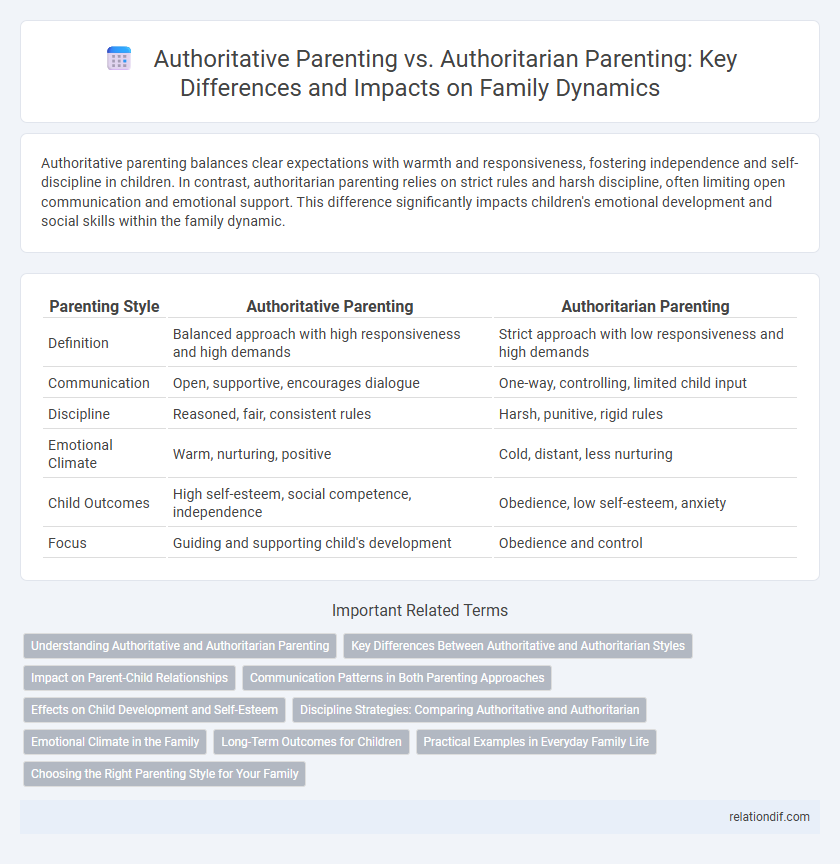Authoritative parenting balances clear expectations with warmth and responsiveness, fostering independence and self-discipline in children. In contrast, authoritarian parenting relies on strict rules and harsh discipline, often limiting open communication and emotional support. This difference significantly impacts children's emotional development and social skills within the family dynamic.
Table of Comparison
| Parenting Style | Authoritative Parenting | Authoritarian Parenting |
|---|---|---|
| Definition | Balanced approach with high responsiveness and high demands | Strict approach with low responsiveness and high demands |
| Communication | Open, supportive, encourages dialogue | One-way, controlling, limited child input |
| Discipline | Reasoned, fair, consistent rules | Harsh, punitive, rigid rules |
| Emotional Climate | Warm, nurturing, positive | Cold, distant, less nurturing |
| Child Outcomes | High self-esteem, social competence, independence | Obedience, low self-esteem, anxiety |
| Focus | Guiding and supporting child's development | Obedience and control |
Understanding Authoritative and Authoritarian Parenting
Authoritative parenting balances high expectations with emotional support, fostering independence and confidence in children. Authoritarian parenting emphasizes strict rules and obedience, often leading to reduced self-esteem and social skills. Research links authoritative parenting to positive developmental outcomes, while authoritarian approaches may increase anxiety and rebellion.
Key Differences Between Authoritative and Authoritarian Styles
Authoritative parenting balances firm expectations with responsiveness, encouraging independence while maintaining clear boundaries through open communication and warmth. In contrast, authoritarian parenting prioritizes strict obedience and control, often employing punitive measures and limiting child autonomy. The authoritative style fosters self-regulation and social competence, whereas the authoritarian approach may lead to lower self-esteem and increased behavioral issues in children.
Impact on Parent-Child Relationships
Authoritative parenting fosters open communication and warmth, promoting trust and mutual respect between parents and children, which enhances emotional bonds and social competence. Authoritarian parenting, characterized by strict rules and high demands without warmth, often leads to fear, resentment, and poorer parent-child relationships. Research shows that authoritative parenting is linked to better psychological adjustment and stronger family cohesion compared to authoritarian approaches.
Communication Patterns in Both Parenting Approaches
Authoritative parenting promotes open and reciprocal communication, encouraging children to express their thoughts and emotions while parents provide guidance with empathy and reason. In contrast, authoritarian parenting relies on directive and one-way communication, where strict rules are enforced without room for dialogue or explanation. These distinct communication patterns directly affect children's social development, self-esteem, and emotional regulation.
Effects on Child Development and Self-Esteem
Authoritative parenting, characterized by warmth and consistent discipline, fosters higher self-esteem and better social skills in children by promoting independence and open communication. In contrast, authoritarian parenting, marked by strict rules and punitive measures, often leads to lower self-esteem, increased anxiety, and poorer social competence due to its controlling and less responsive nature. Studies indicate that children raised under authoritative parenting show improved emotional regulation and academic performance compared to those experiencing authoritarian approaches.
Discipline Strategies: Comparing Authoritative and Authoritarian
Authoritative parenting employs discipline strategies centered on positive reinforcement, clear communication, and consistent boundaries, fostering mutual respect and emotional growth in children. Authoritarian parenting relies heavily on strict rules, punishment, and obedience without explanation, often leading to fear and reduced self-esteem in children. Studies show authoritative discipline promotes better social skills and academic performance compared to the more rigid, control-based methods seen in authoritarian approaches.
Emotional Climate in the Family
Authoritative parenting fosters a positive emotional climate characterized by warmth, open communication, and mutual respect, promoting children's emotional security and self-regulation. Authoritarian parenting often creates a more rigid and stressful family environment marked by high control and low emotional responsiveness, which can lead to increased anxiety and lower self-esteem in children. Research highlights that the supportive emotional climate of authoritative parenting contributes to healthier psychological development compared to the restrictive atmosphere typical of authoritarian households.
Long-Term Outcomes for Children
Authoritative parenting fosters positive long-term outcomes by promoting children's social competence, self-regulation, and academic success through balanced warmth and clear boundaries. Authoritarian parenting often leads to increased risks of anxiety, low self-esteem, and impaired social skills due to its rigid discipline and limited emotional support. Studies indicate that children raised with authoritative methods adapt better emotionally and behaviorally into adulthood compared to those with authoritarian upbringing.
Practical Examples in Everyday Family Life
Authoritative parenting encourages open communication, where parents set clear expectations but remain responsive to their children's needs, such as discussing homework challenges together or negotiating curfews based on maturity. Authoritarian parenting enforces strict rules with little flexibility, often resulting in commands like "Do your chores now" without explanation or opportunity for dialogue. Families practicing authoritative parenting tend to foster independence and self-discipline, whereas authoritarian households may experience compliance driven by fear rather than understanding.
Choosing the Right Parenting Style for Your Family
Authoritative parenting balances clear rules with warmth and open communication, fostering children's independence and social competence while maintaining parental control. Authoritarian parenting relies on strict discipline and high expectations, often leading to obedience but potentially hindering emotional development and self-esteem. Choosing the right parenting style involves assessing your family's values, children's temperament, and the desired balance between structure and support to promote healthy growth.
authoritative parenting vs authoritarian parenting Infographic

 relationdif.com
relationdif.com